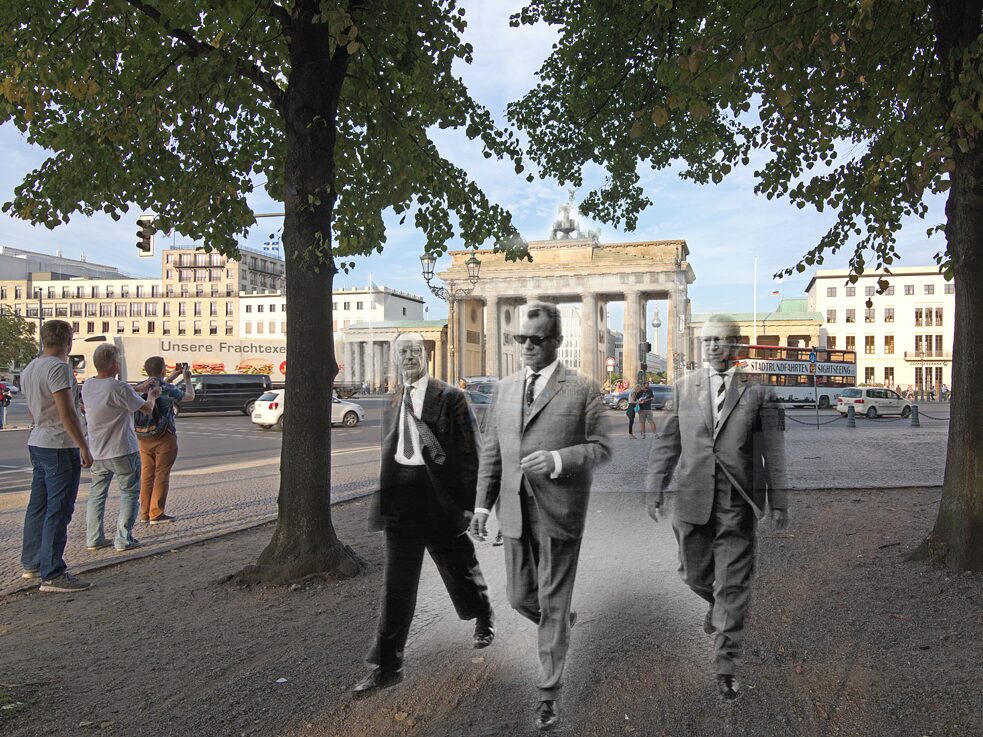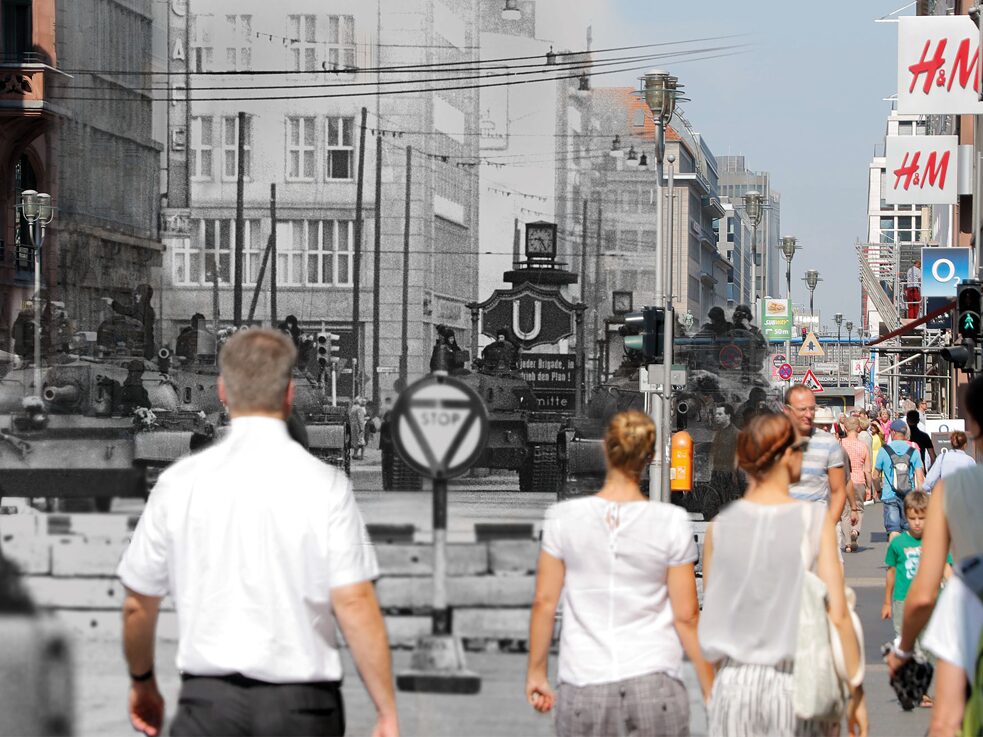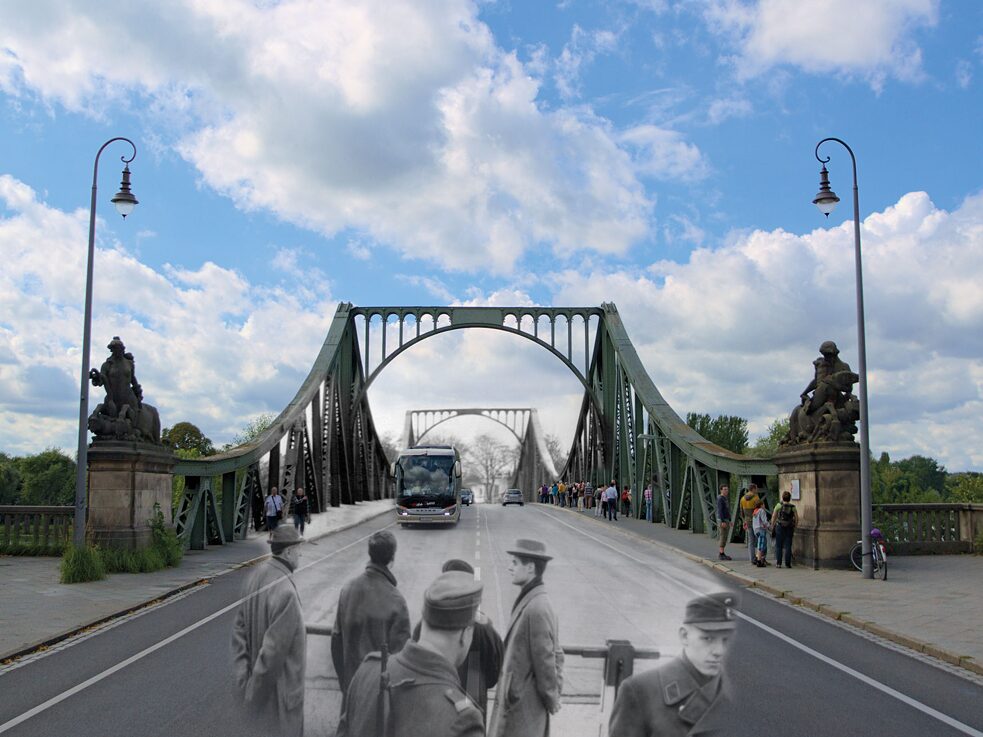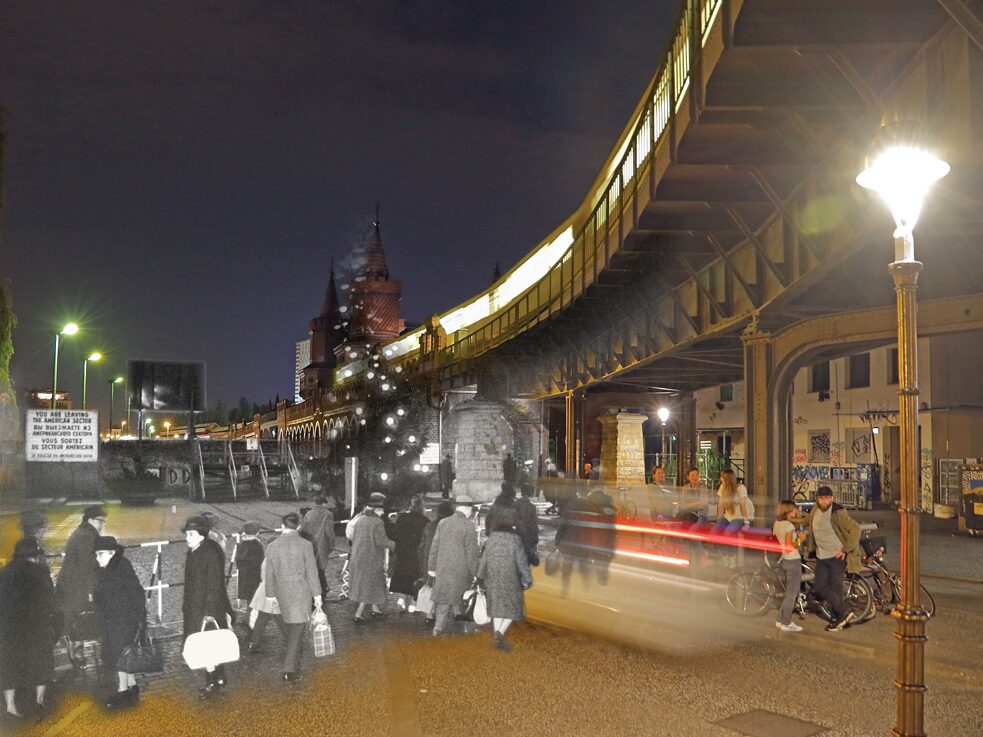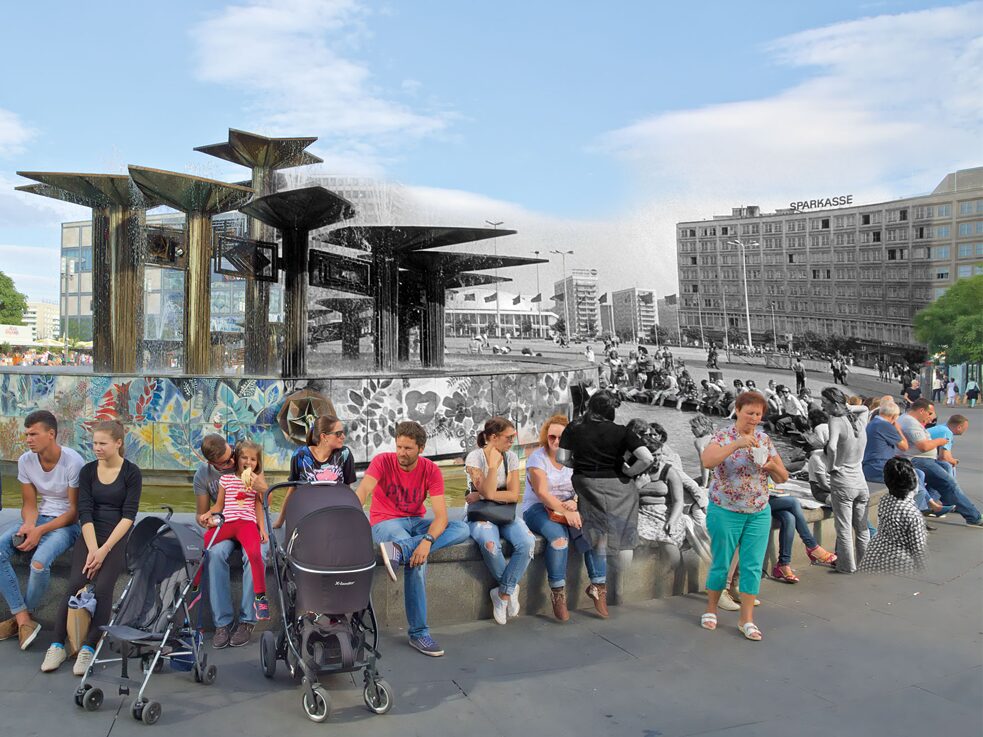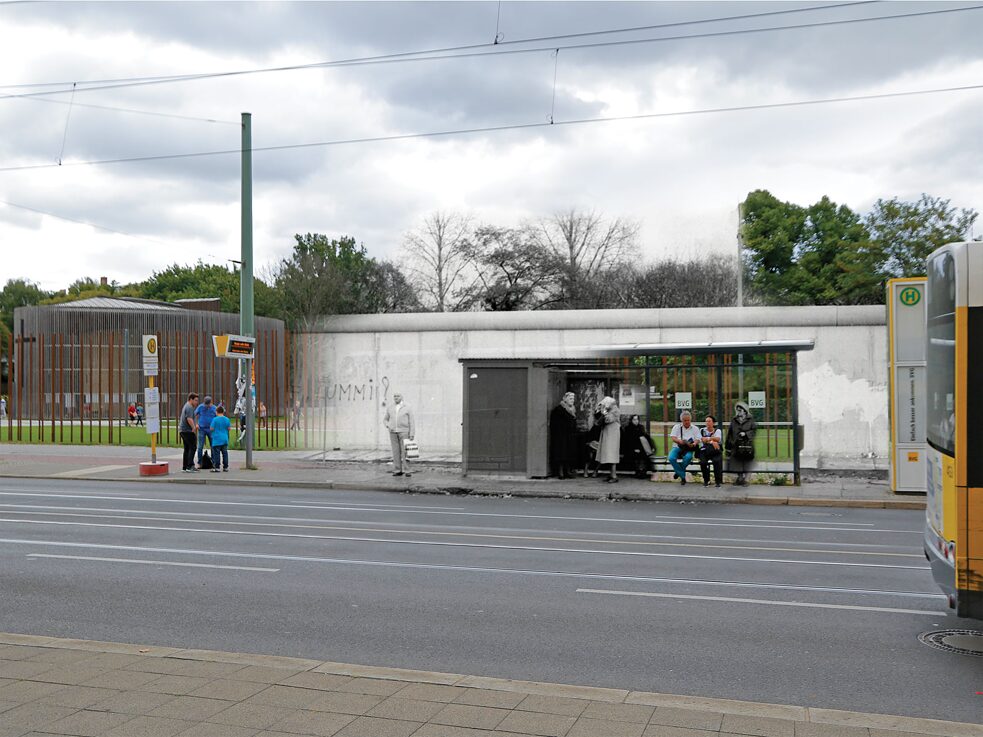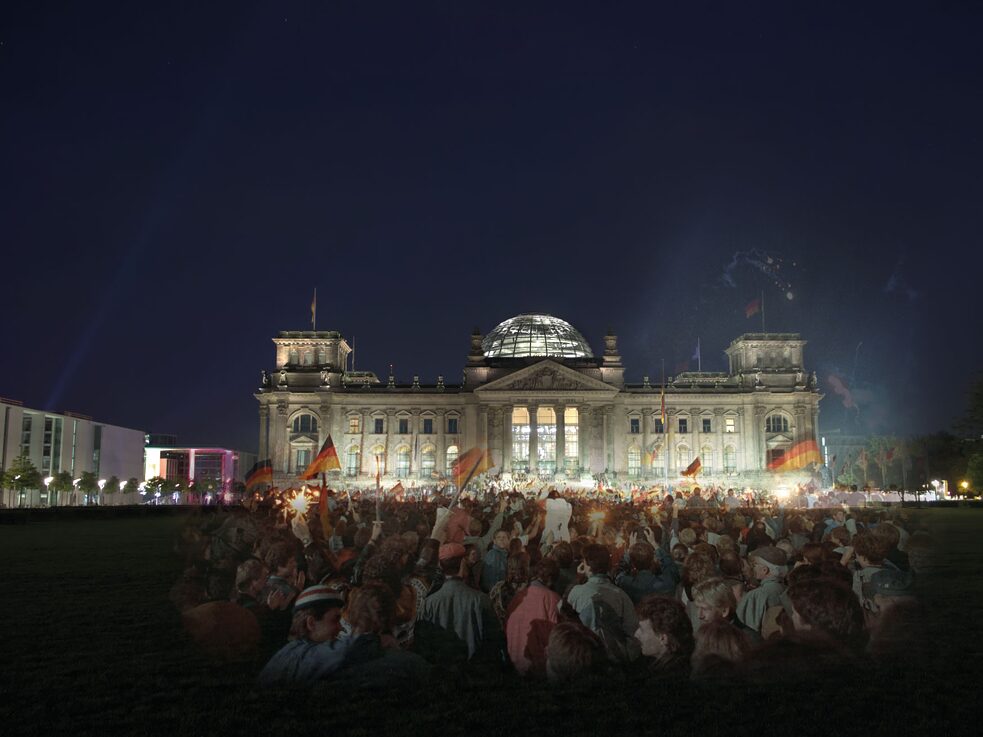30 Years Fall of the Wall
Ghosts of the Past
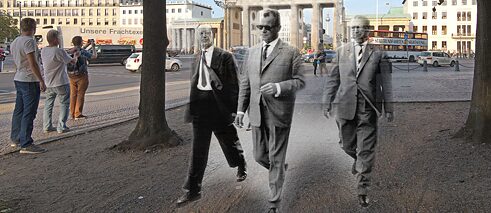
Photo (detail): © pa-picture alliance | © A. Ehrlicher, B. Rehmann
On 3 October 1990 the reunification of Germany brought four decades of division to an end. Since then Germany has changed, especially the former city of the Wall, Berlin. In images of today goethe.de recalls the story of yesterday.
The starting-points were historical photographs of Berlin dating from the building of the Wall to reunification. Axel Ehrlicher and Bettina Rehmann photographed these sites from almost the same angle and composed them into new motifs in which past and present meet.
The Brandenburg Gate
It is a major tourist attraction and a popular photo object – the historic Brandenburg Gate. On 13 August 1961 the then mayor of Berlin, Willy Brandt (centre; to his right the pastor and SPD politician Heinrich Albertz) informed himself about the activities in the sector border in Berlin. The previous night it had been sealed off except for a few crossings. Early in the morning had begun the construction of a barrier.Checkpoint Charlie in Friedrichstraße
On 28 October 1961 Soviet tanks were standing at Checkpoint Charlie, the sector border crossing in Friedrichstraße for diplomats and foreigners: a threatening gesture in response to the preceding placing of American tanks directly on the border between East and West Berlin. Of the conflicts of the Cold War there is no longer a trace in 2015: Friedrichstraße is one of Berlin’s most popular shopping streets.The Glienicker Bridge between Berlin-Wannsee and Potsdam
Today it is an important link between Berlin and Potsdam; before, the Glienicker Bridge marked the border between the GDR and West Berlin. For a long time only military personnel were allowed to cross here. Three times during the Cold War the bridge saw the exchange of high-ranking agents; for instance on 10 February 1962. To general surprise the Soviet Union released from prison the American pilot Gary Francis Powers and turned him over to the Americans. In return the United States set free the Soviet spy Rudolf Ivanovich Abel. The historic photo was taken shortly after the exchange.The Oberbaum Bridge in Friedrichshain-Kreuzberg
Not only at night is the vault bridge over the Spree a meeting place and “party mile” for thrill-seekers. West Berliners who crossed the border checkpoint at the Oberbaum Bridge on the evening of 19 December 1964 also had reason for rejoicing: they were allowed to visit their kin in the eastern part of the city over the holidays. The travel permit agreement of the previous year made for the first time the Wall between East and West Berlin periodically somewhat permeable.Alexanderplatz
It seems not to have changed much; then as now the fountain is a popular meeting place in the heart of Berlin, for resting, relaxing or eating an ice cream. On 29 June 1976 it was 31 degrees centigrade in the shade, an occasion for East Berliners to cool their feet in fountain in “Alex”.Bernauer Straße
Waiting for the bus – an everyday situation, which over the years has remained the same, even if the modern bus shelter is considerably chicer than before. In the background of the original photo from East Berlin in 1982, however, you can still see the Wall: the writing appears to say “Lummi”. From 1981 to 1986 Heinrich Lummer was Senator of the Inner Affairs of West Berlin.The historic centre
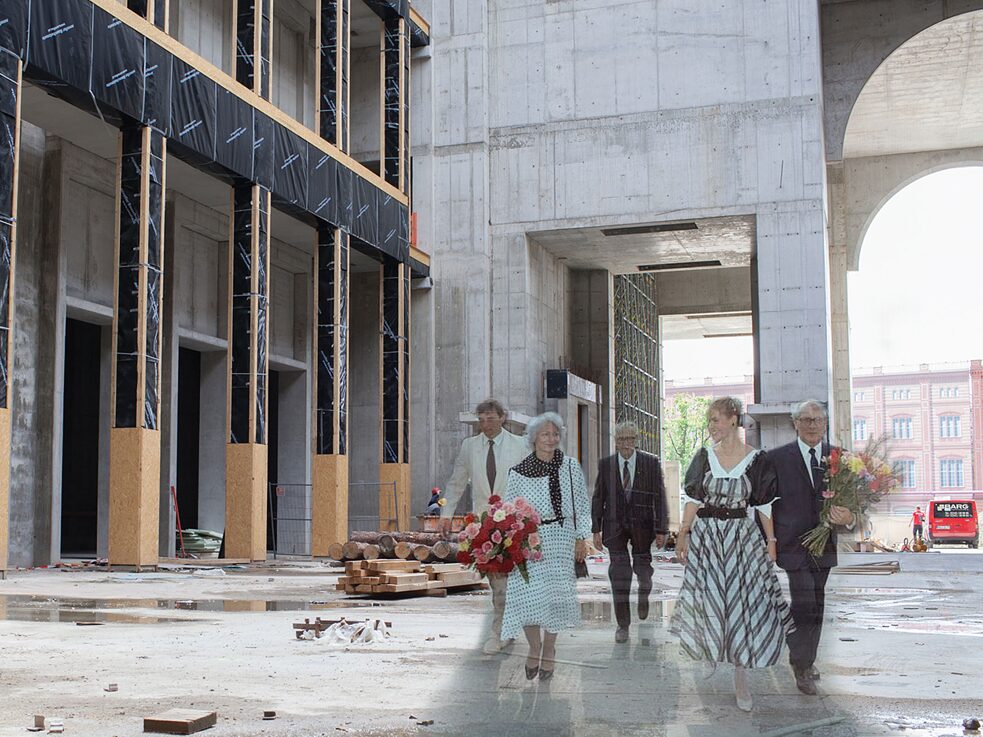 Montage: A. Ehrlicher, B. Rehmann CC BY-SA 3.0, historisches Foto: Bundesarchiv, Bild 183-1984-0831-421 (CC BY-SA 3.0 de) zeitgenössisches Foto: K. Krämer
Today it is a construction site; in the days of the GDR it was still the Palace of the Republic. The site of East Germany’s People’s Chamber was regularly used for events. On 31 August 1984 the General Secretary of the Central Committee Erich Honecker (right), his wife Margot (fourth from right) and the Olympic figure-skating champion Katarina Witt (second from right) were on their way to the athletes ball held in the Palace of the Republic. In December 2008, after the last asbestos-contaminated part of the building had been demolished, it was decided after long debates to restore the historic centre of Berlin in the Marx-Engels Square: there since 2013 the Berlin City Palace has been under reconstruction.
Montage: A. Ehrlicher, B. Rehmann CC BY-SA 3.0, historisches Foto: Bundesarchiv, Bild 183-1984-0831-421 (CC BY-SA 3.0 de) zeitgenössisches Foto: K. Krämer
Today it is a construction site; in the days of the GDR it was still the Palace of the Republic. The site of East Germany’s People’s Chamber was regularly used for events. On 31 August 1984 the General Secretary of the Central Committee Erich Honecker (right), his wife Margot (fourth from right) and the Olympic figure-skating champion Katarina Witt (second from right) were on their way to the athletes ball held in the Palace of the Republic. In December 2008, after the last asbestos-contaminated part of the building had been demolished, it was decided after long debates to restore the historic centre of Berlin in the Marx-Engels Square: there since 2013 the Berlin City Palace has been under reconstruction.
Soviet War Memorial in Treptower Park
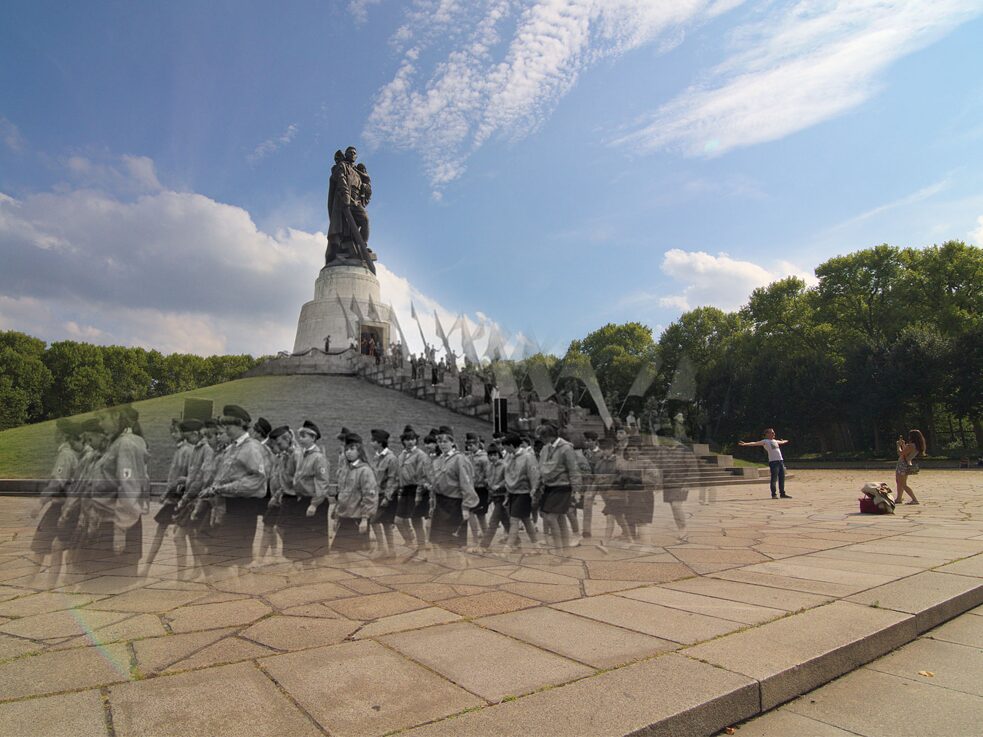 Montage: A. Ehrlicher, B. Rehmann CC BY-SA 3.0, historisches Foto: Bundesarchiv, Bild 183-1987-0727-24, Uhlemann Thomas (CC BY-SA 3.0 de) zeitgenössisches Foto: A. Ehrlicher, B. Rehmann
Some pose, others parade. The Soviet War Memorial in Treptower Park is the largest of its kind in Berlin. Today it is no longer the site of state rituals and mass events. In the days of the GDR that was different: on 27 July 1987 Lenin Pioneers, members of the Komsomol, Thälmann Pioneers and FDJers commemorated fallen Soviet soldiers and officers.
Montage: A. Ehrlicher, B. Rehmann CC BY-SA 3.0, historisches Foto: Bundesarchiv, Bild 183-1987-0727-24, Uhlemann Thomas (CC BY-SA 3.0 de) zeitgenössisches Foto: A. Ehrlicher, B. Rehmann
Some pose, others parade. The Soviet War Memorial in Treptower Park is the largest of its kind in Berlin. Today it is no longer the site of state rituals and mass events. In the days of the GDR that was different: on 27 July 1987 Lenin Pioneers, members of the Komsomol, Thälmann Pioneers and FDJers commemorated fallen Soviet soldiers and officers.
The Bösebrücke in Bornhomer Straße
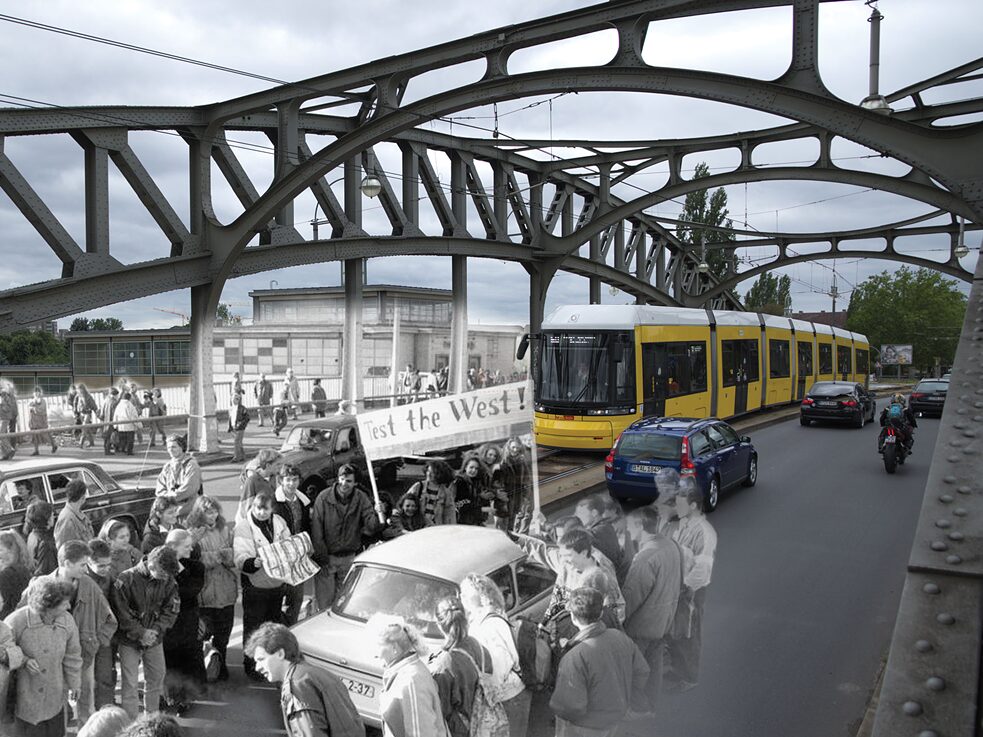 Montage: A. Ehrlicher, B. Rehmann CC BY-SA 3.0, historisches Foto: Bundesarchiv, Bild Bild 183-1989-1118-028 (CC BY-SA 3.0 de) zeitgenössisches Foto: A. Ehrlicher, B. Rehmann
Yesterday Trabis, today the tram. On 10 November 1989 schoolchildren from the West Berlin district of Wedding formed a line at the border crossing on the Bösebrücke in Bornholmer Straße to welcome visitors from East Germany. The night before, this crossing of the Berlin Wall had been the first to open. Today traffic flows quite naturally between the districts of Prenzlauer Berg und Wedding.
Montage: A. Ehrlicher, B. Rehmann CC BY-SA 3.0, historisches Foto: Bundesarchiv, Bild Bild 183-1989-1118-028 (CC BY-SA 3.0 de) zeitgenössisches Foto: A. Ehrlicher, B. Rehmann
Yesterday Trabis, today the tram. On 10 November 1989 schoolchildren from the West Berlin district of Wedding formed a line at the border crossing on the Bösebrücke in Bornholmer Straße to welcome visitors from East Germany. The night before, this crossing of the Berlin Wall had been the first to open. Today traffic flows quite naturally between the districts of Prenzlauer Berg und Wedding.
